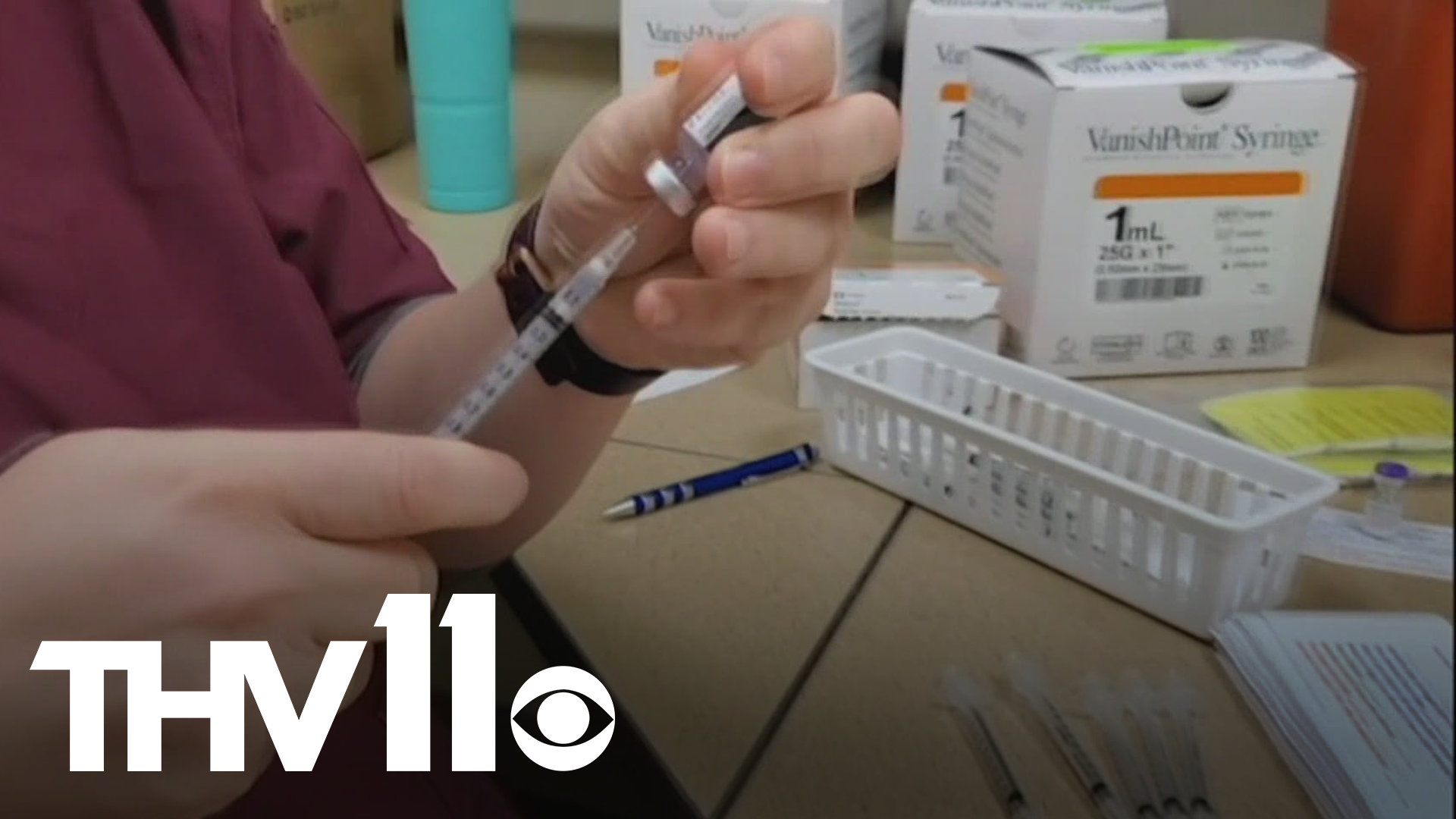DALLAS — President Joe Biden recently tasked a federal health agency to create a system for vaccine mandates in the workplace.
Two dozen Republican attorneys also warned the White House afterward to prepare for legal action against the potential proposed vaccine requirement.
In the public, there have been a lot of questions regarding how this type of order can be implemented.
THE QUESTION
Can the federal government mandate vaccinations for the general public?
THE SOURCE
- Christopher Robertson, professor of Law at Boston University School of Law
- Wendy Parmet, faculty director for the Center for Health Policy and Law at Northeastern University
- Dorit Reiss, professor of Law at the University of California Hastings College of the Law
- Ana Santos Rutschman, assistant professor of law at the Saint Louis University School of Law Center for Health Law Studies
- Stacie Kershner, associate director of the Center for Law Health and Society at Georgia State University School of Law
THE ANSWER
The federal government can't mandate vaccinations for the general public. However, vaccine mandates may be applied to specific groups under the federal government’s jurisdiction.
WHAT WE FOUND
The federal government can’t, on its own, mandate vaccines for the general public. In America's past, most public health rulings have come from either the state level or the local level.
"The federal government needs an enumerated power to act in this space and so that's why it can't just require every citizen to do it on its own," Robertson said. "They have to act through an area where they do have power, like regulating worker safety."
This is why President Biden’s administration tasked the Occupational Safety and Health Administration – or OSHA – with creating and implementing a vaccine mandate for America’s workforce and not the general public.
OSHA exists to provide workplace safety through rules, standards and inspections.
OSHA's upcoming vaccine mandate for workers will be an Emergency Temporary Standard – or ETS – which can only happen if there is the potential for “grave danger” in the workplace.
Since it’s an ETS, the mandate can only last up to six months before going through a normal review.
So while the standard can be implemented quicker than normal, this is why there also needs to be more proof that the health risk is more serious as well.
"The point about the emergency rule is it allows them to bypass the normal administrative procedure act process of waiting for notice and comment," Parmet said. "So it allows them to basically make the rule, allow a rule to take effect once they issue it."
OSHA doesn't have the personnel or enough funding to send out inspectors to see if all of its regulations are being enforced, according to Reiss. She said the agency has to rely on leaks and information coming from the businesses to find out where inspectors need to go to.
"OSHA has been regulating safety in the workplace for decades, and there's a long line of litigation that upholds its power to regulate that," Reiss said. "That includes regulating for safety from preventable disease or regulating from safety from other health conditions."
In June, OSHA created an ETS for healthcare workers that regulated face masks, patient screenings, and the use of aerosol products. It was published in the Federal Register.
It did not include a vaccine mandate.
"Even though regulating the workplace is pretty routine, emergency standards are not routine," Reiss said. "You need to show that it's to prevent exposure to a grave danger from specific things and that it's not just reasonably necessary, but that it's necessary. That's a higher bar."
The ETS issued in response to COVID-19 in June was the first one since 1983. That standard was related to the dangers of asbestos in the workplace. The ETS made its way to the Supreme Court, which did not uphold the regulation.
The Supreme Court said the risk was too low and that it wasn't the role of the federal government to issue this ETS in the way it was outlined.
Another part of the ruling read in part:
"In this final rule, based upon the record evidence, OSHA is adopting certain regulatory recommendations made in the earlier rulemaking, is rejecting other recommendations, and is issuing other provisions which are based on, but are altered versions of yet other recommendations in the earlier rulemaking. In addition, new, different and expanded provisions also have been urged for adoption by participants in this rulemaking. These participants represent labor, public interest and industry interests. The Agency is adopting, rejecting and changing these recommendations as well."
Legally, there’s no precedent for the government to mandate vaccines for the general public. George Washington instituted a system for new Revolutionary War recruits to be inoculated with smallpox immediately upon enlistment, but the true smallpox vaccine was not created until after the Revolutionary War.
"A modern vaccine, like you and I understand to be a vaccine, the vaccines at stake right now, no, that has really never happened as we're seeing it happen today," Rutschman said, talking about a federal vaccine mandate.
The Supreme Court case from 1905, Jacobson v. Massachusetts, dealt with a vaccine mandate for smallpox.
In this case, states enforced the law, not the federal government. This is because states have a constitutional capacity known as "police power" that allows for this type of mandate. It does not apply to the federal government.
"It's not a legal precedent," Rutschman said. "A legal precedent has to be so close to what you're saying that either you're persuaded by it or bound to it. We don't have either."
In 1977, the federal government helped create the Childhood Immunization Initiative, which had the purpose of getting more kids vaccinated by providing a more permanent system of vaccination services.
While this included increased funding for these vaccinations and more review of children's vaccination records in the school system, it didn't include a mandate.
It is true that the federal government has required vaccines under outlined circumstances, such as for immigration, traveling or parts of the military. However, it's always been for specified groups.
"The federal government has not historically mandated vaccines for the general public," Kershner said.
Health law experts said once OSHA provides more details about how this mandate will be enforced, it will then be easier to predict if it will potentially be challenged or held up in court.
"We need to wait and see exactly what it's going to look like," Parmet said. "How it's going to be implemented. The details. A lot yet remains to be seen."


